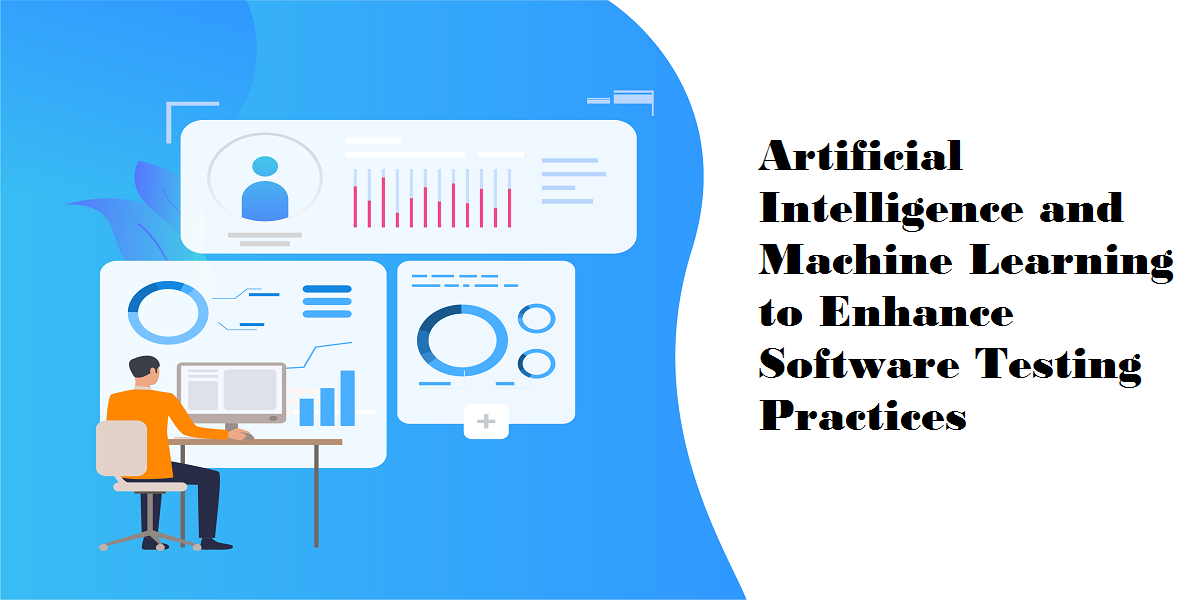
Artificial Intelligence and Machine Learning to Enhance Software Testing Practices
- By Martin Moyers
- 01-09-2020
- Artificial Intelligence
Artificial intelligence (AI) stands out as an attention-grabbing revolutionary aka technology to meet the comprehensive demands of tech-savvy customers. Corporates want software products to be delivered with the utmost precision at a breakneck pace. AI is set to become a next digital frontier as products are getting complex in nature and codes are getting challenging which intensifies the eminence of testing accurately. Software testing procedures have to have unrestrained scalability along with ensured time and cost efficiency to reinforce teams in developing error-free products. AI has to intervene as manual testing has its own limitations. It was unable to keep up with the ever-increasing demands of impatient clients. The traditional approach has posed numerous challenges and constraints. Such alarming situations call for the intervention of enabling technologies to root out the lacuna and fine-tune the traditional software testing solutions to handle a sheer amount of data effectively, efficiently, and strategically.
Modern-age AI solutions in the testing realm boost operational efficiency, optimize the complex processes, and offer delightful experiences to the end-users. AI provides a dynamic framework for organizations that are striving for accuracy where Agile and DevOps practices accelerate the speed of software development. These frameworks can help them predict, identify, and correct the code writing errors even before they occur. The higher the number of data patterns that machine learning analyzes, the higher will be the number of learned patterns. Furthermore, these patterns become valuable insights that contribute to making technologies smarter by enriching their capabilities. Without any further ado, let’s check out the core advantages of implementing AI for software testing.
Challenge 1 - Robustness, agility, and innovativeness.
AI has become indispensable to survive in the contemporary hyper-competitive markets. The effectiveness of the testing process determines the success of a software product. No wonder, why organizations always look up for smarter ways of testing. Testers have started to acknowledge the capacity of AI to infuse agility in their day to day routine tasks. Incorporating AI and machine learning make the software development lifecycle more streamlined as skewed test results or overlooking bugs can tarnish the brand image. Organizations imbibe machine learning in the systems that execute the desired knowledge to assist testers to get more accurate results and reduce the probability of errors. Along with injecting robustness in the workflow, AI opens the doors for innovative-thinking which further results in the development of sophisticated features.
Engineers can spend their precious time on more strategic tasks as AI takes care of all the repetitive tasks that need to be done on a daily basis. Had AI not been involved, the engineers would have chained to the routine affairs. AI algorithms can identify, store, and analyze data sets to accelerate the testing process as speed, cost, and efficiency are pivotal to testing software codes. Automated testing helps organizations to improve the depth and scope of tests that improve software quality. Some of the profoundly used AI-based test automation tools are Testim.io, Appvance, Test.ai, and Functionalize. Involving AI in software testing analyzes memory, file contents, data tables, internal program states, etc., to make sure the software product is acting in the same way it was intended to. AI can automate mundane tasks in development and testing to make routine tasks easier and simpler.
Challenge 2 - Accuracy, precision and reliability.
Software testing strives to achieve the goal of accuracy. Bugs and errors are inevitable when it comes to testing and are bound to occur during software development. Testing is all about ensuring the utmost accuracy with an assurance that all the bugs are successfully removed from the product. If these bugs are not identified at the right time then these errors could prove extremely expensive to the organizations by putting millions of dollars at stake. Also, one of the biggest hindrances that manual testing faces is that there are a fair amount of chances for even the most adept testers to make human-prone errors. These circumstances require smart technology that could solve these issues. As and when AI takes the command of repetitive tasks, testers can concentrate on developing powerful automation solutions and exploratory activities for them. QA automation testing services are getting popularity in testing to ensure unfailing accuracy in the testing approaches.
An approach powered by AI, Machine Learning, and Predictive Analysis is significant in improving the accuracy in software testing practices. AI can identify defects in seconds and analyze them to draw meaningful inferences and it automates the system as bugs can increase when data grows manifold. With AI in place, codes can be automatically corrected, and error tracking is assigned to the designated teams with a record of debugging logs failures and duplicate defects. Organizations leverage AI and Machine Learning algorithms to highlight coding mistakes and bugs to make sure developers don’t include them whilst working on codes. AI algorithms assist teams in saving a huge amount of time, effort, and resources which otherwise wouldn’t be possible with manual techniques. Integrating AI in testing can result in savings. And, savings in time and money equals robust time to market as automated tests can be executed again at a rapid speed. Organizations also partner with automation testing services to improve business and operational accuracy.
Challenge 3 - Decision-making, transparency, and flexibility.
Today’s techno-complex world demands swift decisions. AI applications, machines that mimic human behavior and smart algorithms speed up the decision-making process by helping testers to track the changes and plan the releases in an organized manner. Smart technologies like AI and machine learning are pivotal to spruce up the entire software testing processes as the releases are happening more frequently like never before. Prompt actions require prompt decision-making as well. Testers can progressively walk on the path of automation or precision-based testing and think beyond the boundaries of legacy or traditional manual testing models. AI can identify errors, bugs, or any technical glitch before it could cause any hindrance in the decision-making process. Timely detection and identification can warn the concerned person to take timely action on the same.
AI-powered continuous testing platforms can immediately identify malfunctioning and the updated algorithms can uncover even a minute misconfiguration that has occurred in the pattern. Fast-paced testing improves decision making. Speed of manual testing can take a toll on resources and costs, and regression testing can exacerbate challenges for Quality Assurance (QA) teams. AI can automate the test processes and enable continuous testing at a robust speed. Another important factor to consider is flexibility. Even a simple amendment or change in an application can cause test failure in automation tools. AI and machine learning facilitate a flexible testing process and draw inferences among various segments of documentation. AI-powered systems are not only flexible but also can adapt to the changes or amendments in real-time to maintain the flexibility that further helps in decision making.
Challenge 4 - Competitive landscape, edge, and advantage.
Startups and enterprises are contemplating the power of AI to gain a competitive edge in the market. In the near future, AI is expected to achieve a lot more than merely being an assisting technology to the testers. AI is set to perform a myriad of roles in software development for every possible domain to deliver top-notch products. AI with its ability to ‘think, learn, and execute’ has evolved as the panacea to all the software testing woes to give organizations a strong competitive first-mover advantage. AI helps organizations to enhance the scope of tests and AI-powered test automation helps teams to execute numerous test cases in one test run which gives them an edge over competitors grappling with manual testing.
AI solves challenges related to resource crunch, project operations, risk assessment, release time, time to market, testing functionality, and monotonous routine affairs. AI drives an innovative environment within the organization and more room for creativity, and exploratory aspects of testing among the teams. Test automation is gaining momentum. AI plays a critical role in taking test automation to the new level in the DevOps environment and in overcoming test automation bottlenecks. Some of the major benefits of test automation are improved test coverage, better defect detection, reuse of test cases, and transparency of test activities, and reduction in test cycle time and test costs. AI and machine learning enable smart test orchestration and identify tests for every cycle of software development as orchestrating test automation in CI/CD pipelines can be challenging. AI-driven testing can speed up the SDLC to drive up organizations’ revenue and helps in visual validation. Image and pattern recognition make AI capable of detecting visual errors or bugs through visual testing of products.
Challenge 5 - Clients’ demands, expectations, and experiences.
A well-crafted strategy not only aids organizations to predict their clients’ needs beforehand but also provide an edge over competitors in the ever-expanding markets. Predictive analytics has a significant role to play in QA to better analyze and predict large data sets to make out what features or attributes they would like to have in the products. The involvement of AI, Machine learning, and predictive analytics shorten the testing process, empower testers to understand clients’ needs and fulfill their expectations. All these factors get combined to provide exquisite user experience by ensuring high-performance. Testing using AI automated tools can increase productivity and AI testing tools can improve the software quality and increase the test coverage as well for accurate results. Companies that are equipped with cutting-edge technologies and know how to leverage them have a strong upper hand in the market and caliber to surpass clients’ expectations. Hire a mobile app company for the best AI app solution.
Corporates across the globe want to dive deep into a digital world which has created a steep demand for innovative software. Continuous testing requires additional support like AI to identify and root out the technical complexities. Cutting-edge businesses turn to AI as it can advance software testing by automating tasks. They have realized the need of digital testing to satisfy clients’ expectations on the quality requirements harnessing the power of AI that mimic human behavior and intelligence to simplify inherent complexities. Organizations either resort to in-house teams or QA outsourcing or contact QA automation testing services companies to root out the challenges associated with traditional testing methods. AI bots are evolving to improve the quality of software products as these bots can better understand users’ requirements and can efficiently and effectively develop codes for the test cases.
Conclusion - QA ecosystem is ready to deploy AI technology for state-of-the-art products that can take startups and enterprises to the whole new horizon.
The ever-expanding surface area of QA acts as a breeding ground for complexities that were never known before. Software testing occupies a predominant role to build clients’ faith in the software product and ensure clients’ satisfaction by making sure that the final product has no errors whatsoever. Technological advancements like AI and machine learning are bound to impact testing as the foundation of a product relies heavily on how flawless a product is. Organizations are turning towards AI and automation to safeguard products by testing progressively. Smart technology like AI can save a lot of time and effort as a huge part of testing involves repetition and it can make test environments more innovative. AI algorithms streamline the testing processes and assist testers to find the maximum errors to make the product more trustworthy.
Organizations have to act smarter as continuous testing alone can not match the pace of decreasing delivery cycle times, growing technical challenges so on, and so forth. Machine-based intelligence is imperative as SDLC and collaboration have become increasingly challenging and testers need to transmit the information, analysis, and observations to developers in real-time. Machines will execute test codes with minimal human involvement. Getting smarter with AI and machine learning is the only choice that testers have to keep up the pace with rapid evolution and withstand the complex market challenges. Software testing has been transitioning to become more automated to provide maximum accuracy to those who embark on the digital transformative journey. The testing world is ready to embrace AI and machine learning to take businesses to the next level.
Recent blog

Crafting Eye-Catching Instagram Reels In Just 9 Easy Steps
Social Media | 25-04-2024.png)
Boost Sales and Conversions with Shopify's New AI-Powered Semantic Search
E-commerce | 24-04-2024




